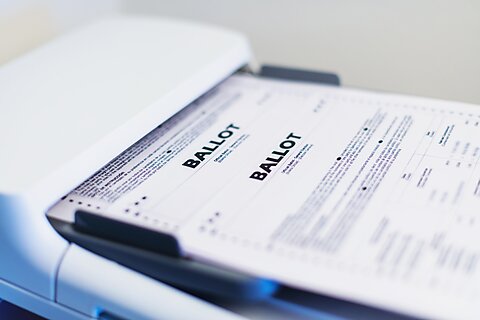Walter Olson
Two weeks ago I noted that one principle of fair elections, transparency, can be in tension with another, the secret ballot. The tension plays out in current discussion as to how far election administrators should go in making public the data that underlie election results even when doing so might allow inferences about how individuals voted.
The controversy involves two different information formats often confused with each other that should be kept straight. Cast vote records are electronic summaries of individual ballots and the choices made on each, which may also carry additional information such as a timestamp of when the vote was received. These records can be of considerable interest to politics buffs. For example, they can reveal how persons who voted for a given candidate voted on other races—something you couldn’t necessarily deduce from conventional aggregated election results.
Ballot images go further: they are literal pictures of filled‐out ballots, which means they also record stray marks and cross‐outs, write‐ins, coffee stains, and anything else that may have found its way onto the paper (you’re not supposed to write in the margins on your ballot, but some voters do, and even sign their names.)
Both kinds of records can hold interest for researchers; for example, they can shed light on unintended consequences of ballot design for voter behavior. They can offer a practical benefit in case of close elections by allowing the side that is behind to check quickly how many ballots are marked ambiguously, which can make the difference in whether it is worth pursuing a recount or challenge.
For all these reasons, to pursue general goals of transparency, and sometimes because they see it as required by public records law, quite a few states and localities have been releasing one or both of these records for some time. There don’t seem to have been any privacy disasters—yet, at least.
What are the privacy hazards? If you’re one who likes to write and sign little messages on the ballot when you vote, obviously, the release of ballot images may bring both your message and your identity to the attention of strangers. But it’s possible that someone can deduce which ballot is yours even if you don’t do that, and without the visual image. You might be the only one in your small precinct to back a third‐party candidate or write‐in. The chances of identification rise if the record carries a timestamp or sequence‐of‐ballots‐received number and someone remembers you voting first thing in the morning.
Administrators might evade these hazards by redacting or combining some data before public release—grouping precincts together, for example. But that comes at a cost in further expense and delay, as well as making the data less useful.
A new law enacted by the Minnesota legislature as part of wide‐ranging election reform takes a middle course. It classifies ballot images themselves as sensitive individual data not to be released, but it directs that cast vote record (CVR) data be made public unless it falls into certain categories “likely to facilitate associating votes with particular voters, such as showing the order in which the votes were cast,” to quote one report.
One reason the landscape is changing quickly is that election administrators have scrambled to respond to a wave of public records requests for cast votes; election conspiracy buff Mike Lindell has urged his followers to file such requests. Some offices calculate that pre‐emptively releasing the records to everyone would be easier than coping with the request barrage.
Admittedly, the disclosure is unlikely to satisfy the most ardent #StopTheSteal believers, who may interpret redaction of timestamps, for example, as evidence that the authorities are trying to cover up midnight vote “dumps.” Yet the same data might persuade or reassure others.
Arizona Secretary of State Adrian Fontes, who favors aggressive transparency in a state torn by election bickering, says releasing the full data could force conspiracists to play on a level field with less committed observers who currently lack a way to evaluate claims of occult goings‐on. If things went well, according to a Washington Monthly account sympathetic to the idea, fanciful claims of ballot mishandling “could also then be checked by other outside groups and individuals with direct access to the same ballot images.”
At a time when a majority of adherents to one political party tell pollsters they don’t accept the other side’s win as legitimate, it’s hard not to be curious about what greater transparency might accomplish.

